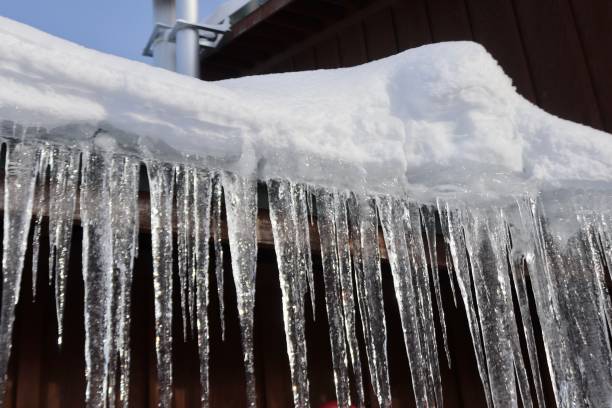We have noticed this post on Preventing and dealing with frozen pipes below on the net and concluded it made good sense to discuss it with you on this page.

Winter can ruin your pipes, specifically by freezing pipes. Below's how to prevent it from occurring and what to do if it does.
Intro
As temperature levels decline, the risk of icy pipelines rises, possibly resulting in expensive repairs and water damage. Understanding just how to avoid frozen pipes is important for homeowners in chilly climates.
Understanding Icy Pipelines
What causes pipes to ice up?
Pipes freeze when revealed to temperature levels listed below 32 ° F (0 ° C) for expanded periods. As water inside the pipes ices up, it increases, taxing the pipeline walls and possibly causing them to rupture.
Threats and problems
Frozen pipelines can bring about water system interruptions, residential property damages, and pricey repair services. Ruptured pipelines can flood homes and cause considerable architectural damages.
Indications of Frozen Water Lines
Recognizing icy pipelines early can stop them from breaking.
Exactly how to recognize icy pipelines
Try to find reduced water flow from taps, uncommon smells or noises from pipelines, and visible frost on revealed pipes.
Avoidance Tips
Insulating vulnerable pipelines
Wrap pipes in insulation sleeves or use heat tape to secure them from freezing temperature levels. Focus on pipes in unheated or outside areas of the home.
Home heating techniques
Maintain interior spaces adequately heated up, specifically locations with pipes. Open up closet doors to permit cozy air to flow around pipes under sinks.
Shielding Outdoor Pipes
Garden hoses and outside taps
Disconnect and drain pipes garden pipes before winter months. Install frost-proof spigots or cover exterior faucets with shielded caps.
What to Do If Your Pipes Freeze
Immediate actions to take
If you believe frozen pipelines, keep taps available to soothe pressure as the ice thaws. Use a hairdryer or towels taken in warm water to thaw pipelines gradually.
Long-Term Solutions
Structural adjustments
Take into consideration rerouting pipes far from exterior wall surfaces or unheated areas. Include added insulation to attics, cellars, and crawl spaces.
Upgrading insulation
Purchase high-grade insulation for pipes, attics, and wall surfaces. Appropriate insulation helps preserve consistent temperatures and decreases the threat of frozen pipes.
Verdict
Avoiding frozen pipes needs aggressive steps and fast reactions. By comprehending the causes, signs, and preventive measures, house owners can secure their pipes throughout cold weather.
Helpful Tips to Prevent Frozen Pipes this Winter
UNDERSTANDING THE BASICS: WHY PIPES FREEZE AND WHY IT’S A PROBLEM
Water freezing inside pipes is common during the winter months, but understanding why pipes freeze, and the potential problems it can cause is crucial in preventing such incidents. This section will delve into the basics of why pipes freeze and the associated problems that may arise.
THE SCIENCE BEHIND FROZEN PIPES
When water reaches freezing temperatures, it undergoes a physical transformation and solidifies into ice. This expansion of water as it freezes is the primary reason pipes can burst. As the water inside the pipe freezes, it expands, creating immense pressure on the walls. If the pressure becomes too great, the pipe can crack or rupture, leading to leaks and water damage.
FACTORS THAT CONTRIBUTE TO PIPE FREEZING
Low Temperatures: Extremely cold weather, especially below freezing, increases the risk of pipes freezing. Uninsulated or Poorly Insulated Pipes: Pipes located in unheated areas, such as basements, crawl spaces, or attics, are more prone to freezing. Insufficient insulation or lack of insulation altogether exacerbates the problem. Exterior Wall Exposure: Pipes running along exterior walls are susceptible to freezing as they encounter colder temperatures outside. Lack of Heating or Temperature Regulation: Inadequate heating or inconsistent temperature control in your home can contribute to frozen pipes. PROBLEMS CAUSED BY FROZEN PIPES
- Pipe Bursting: As mentioned earlier, the expansion of water as it freezes can cause pipes to burst, resulting in significant water damage.
- Water Damage: When pipes burst, it can lead to flooding and water damage to your property, including walls, ceilings, flooring, and personal belongings.
- Structural Damage: Prolonged exposure to water from burst pipes can compromise the structural integrity of your home, leading to costly repairs.
- Mold and Mildew Growth: Excess moisture from water damage can create a favorable environment for mold and mildew growth, posing health risks to occupants.
- Disrupted Water Supply: Frozen pipes can also result in a complete or partial loss of water supply until the issue is resolved.
WHY CERTAIN PIPES ARE MORE PRONE TO FREEZING
- Location: Pipes located in unheated or poorly insulated areas, such as basements, crawl spaces, attics, or exterior walls, are at higher risk of freezing.
- Exterior Pipes: Outdoor pipes, such as those used for irrigation or exposed plumbing, are particularly vulnerable to freezing as they are directly exposed to the elements.
- Supply Lines: Pipes that carry water from the main water supply into your home, including the main water line, are critical to protect as freezing in these lines can affect your entire plumbing system.
- Underground Pipes: Pipes buried underground, such as those connected to sprinkler systems or outdoor faucets, can be susceptible to freezing if not properly insulated.
https://busybusy.com/blog/helpful-tips-to-prevent-frozen-pipes-this-winter/

I hope you enjoyed our article on How to prepare your home plumbing for winter weather. Thanks a ton for spending some time to browse our piece. In case you enjoyed reading our blog post please don't forget to pass it around. Many thanks for your time. Revisit us soon.
Book Service